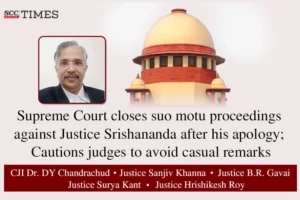Supreme Court: In a suo motu case concerning the controversial ‘Pakistan’ and ‘undergarment’ comments made by Karnataka High Court judge, Justice Vedavyasachar Srishananda, a 5-Judge Bench comprising Dr. DY Chandrachud, Sanjiv Khanna, BR Gavai, Surya Kant and Hrishikesh Roy, JJ. while accepting the apology of the Judge, advised that judges should avoid casual comments which are misogynistic and prejudicial to any community.
The bench had sought the assistance of Attorney General (AG) R Venkataramani and Solicitor General (SG) Tushar Mehta in the matter.
The Court noted that a report dated 23-09-2024 as directed in the previous order, was submitted and observed that the report dealt with two proceedings before the judge. The first one took place on 06-06-2024 and then another on 28-08-2024.
The Court noted that after the suo motu action, on 20-09-2024, Justice Srishananda proceeded to read out an address in presence of members of the bar and members of Bengaluru Advocates Association. As per his address certain observations by him were quoted out of context, were unintentional, not meant to hurt sentiment of any segment of a society and that an apology is tendered if any section of the society is affected by such observations.
The Bench said that bearing in mind the apology rendered by the judge in open court proceedings, it is not in the interest of justice and dignity of institution to continue the proceedings further. However, before closing, the Court made some observations.
The Bench mentioned that it desisted from issuing notice to the High Court judge in interest of judicial dignity.
The Court said that the prevalence and reach of social media have included wide reporting of court proceedings. Most High Courts in the country have now adopted rules of livestreaming or conduct of video conferencing which emerged as a need during covid pandemic, and it became an important outreach facility for court to meet out access to justice. All parties, judges, lawyers, litigants must be aware that proceedings reach audiences who are well beyond the physical precincts of the court and thus all must be aware of the wider impact of observations on the community at large.
The Court emphasised that as judges we are conscious of the fact that everyone has a set of predispositions based on early or later experiences of life. It is important that judges are aware of their own predispositions. The heart and soul of a judge is when they are impartial and only then they can deliver justice.
Thus, the Court underscored that casual observation may indicate personal biases especially when perceived to be directed at a certain gender or community. One must be wary of making patriarchal or misogynistic comments.
Expressing serious concerns about observations on a certain gender or a community, the Court said that such observations are liable to be construed in a negative light.
The Court orally remarked that “no one call any part of India as Pakistan, it is fundamentally against the territorial integrity of the nation.”.
Source: Press

